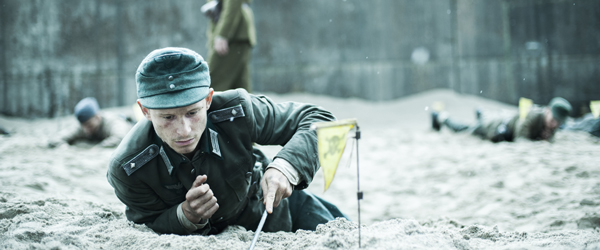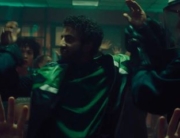If Americans think of Denmark during the German occupation, from the April 1940 invasion to the Victory in Europe Day of May 8, 1945, they probably only recall the citizen effort that helped most of the Jews escape the 1943 Nazi roundup. But writer/director Martin Zandvliet is infuriated over what his fellow Danes did in the five months immediately after the war, and Land of Mine graphically shows how they treated German prisoners of war.
In the naturalistic style of his very contemporary debut film Applause from 2009 (with the same cinematographer, his wife, Camilla Hjelm Knudsen), Zandvliet thrusts us into the exhaustion of military demobilization. Grizzled Sergeant Rasmussen (Roland Moller) looks done with the war, but his supercilious Captain Ebbe (Mikkel Boe Folsgaard) peremptorily gives him a tough assignment on a tight deadline: to take a truck load of German soldiers and have them remove a sector of the 1.5 million landmines the enemy buried as part of the Nazis’ Atlantic Wall defense against a possible Allied invasion. Rasmussen calculates about 45,000 landmines can be cleared at the rate of six mines an hour to clear the shoreline in three months.
But that’s before he really takes a look at his dozen prisoners. He barks out instructions assuming they are the remnants of the fierce, professional German Army, but as the camera pans the soldiers’ faces, the sergeant sees that they are instead leftovers, boys and young teens who had almost no military training. He offers them freedom in exchange for defusing a quota of mines, but realizes he has to teach them how to do it.
These homesick lads certainly don’t justify the nervousness and continued loathing the local civilians and Danish soldiers heap upon them. But the sergeant recognizes they can’t work without decent food, though they are the last on any list to get rations, causing Rasmussen to defy his commander to get them more food. While the Germans are locked into a bare, isolated barracks at night, we get to know them as they talk and argue and reveal the pasts and hopes of Sebastian (Louis Hofmann), Helmut (Joel Basman), Ludwig (Oskar Bokelmann), and the twins Ernst and Werner (Emil and Oskar Belton).
The sergeant and the audience can’t help but sympathize with the boys during their grueling days crawling on the beach finding and defusing mines, where the slightest carelessness or distraction leads to an explosion. We hear the noise and see the smoke and shocked reactions—blood and body parts are not necessary for a gut-wrenching reaction. Rasmussen, more and more paternally, turns up the pressure on his charges to get them to work more carefully under these impossible conditions. (If you remember the high casualties in the TV series Danger UXB about defusing mines in Britain during World War II, those were based on real people who were trained specialists in home territory.)
Without giving away spoilers about the fictionalized characters, a scroll at the end reports that more than half of the 2,000 German soldiers assigned to this dangerous project were killed or severely wounded—more dead than through the occupation of Denmark. The violation of the Geneva Convention of 1929 against using prisoners of war for forced labor was skirted by labeling the Germans as “voluntarily surrendered enemy personnel.” An Oscar nominee for Best Foreign Language Film, Land of Mine is a vivid and timely reminder of the terrible risks landmines still pose around the world—the International Campaign to Ban Landmines won a Nobel Prize in 1997 for its work.
For another sympathetic take on the German boys who the Nazis sent to the front in 1945, look for Heiner Carow’s banned East German film The Russians Are Coming. Still controversial in 1968, it was recently restored and shown in “To Save and Project,” the Museum of Modern Art’s international festival of film preservation.







Leave A Comment